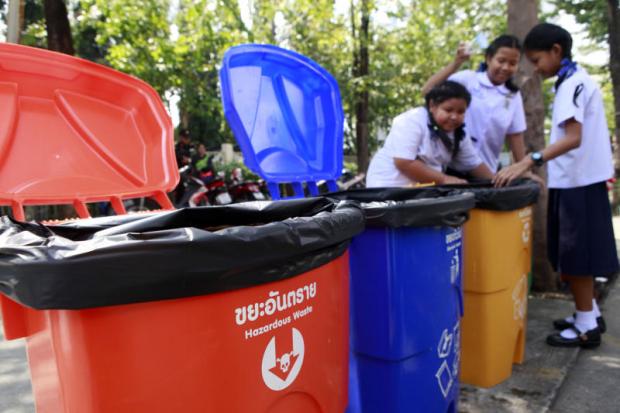
Pannara "Nong Nana" Borivatanant, a primary school student, had never given a thought when tucking into takeaway food of the damage producing styrofoam containers does to the environment, until she attended a school recycling programme.
After discovering the production of the packaging creates heavy pollution and accelerates climate change, Nong Nana decided it was time to do her bit to reverse climate change and cut down on her use of disposable containers.
"I want to help make the world greener," said Nong Nana, 10, a Prathom 4 (Grade 4) student at Praram 9 Kanjanaphisek School.
She plans to switch from disposable containers to environmentally-friendly ones, and to reduce the amount of refreshments and snacks she consumes in a bid to protect her health and cut down on plastic and disposable packaging.
"I am planning to take a tumbler to school. I will use my own plate instead of disposable ones at the food shops," she added.
Located in Huai Khwang district, Praram 9 Kanjanaphisek School is one of six schools under the Bangkok Metropolitan Administration (BMA) to join a green project initiated by its Environment Department.
The other five are Matthayom Suwitsereeanusorn School in Prawet district, Khlong Songkratiam School in Lat Phrao district, Sri-iam Anusorn School in Bangna district, Khlong Bangprom School in Thawi Watthana district, and Ratchamontri (Pluem Chuemnukul) School in Bang Khunthian district.
The schools also serve as learning centres on methods of waste disposal and management.
Officially launched on Nov 23 by deputy city clerk Wantanee Wattana, the centres teach students about recycling and how to properly dispose of rubbish.
Sudarat Suppasan, a teacher at Praram 9 Kanjanaphisek School overseeing green projects, said she found students who took part in the projects developed discipline and responsibility to care for their local community and environment.
The project has been running at the school for more than three months.
"The students are more engaged when they have first-hand experience and participate in a project that uses their skills to complete activities and accomplish tasks," she said. Her primary-level school has 1,185 students.
Ms Sudarat said the BMA-initiated recycling activities are adding value to green projects started by the school last year.

Recycling bins are provided at Praram 9 Kanjanaphisek School for school children to learn how to separate waste and help make the world greener. Photos by Apichart Jinakul
The environmentally-friendly project initiated by the Chaipattana Foundation, the BMA, the Ministry of Natural Resources and Environment, and the private sector, pays tribute to the 60th birthday of Her Royal Highness Princess Maha Chakri Sirindhorn, who is a strong advocate of community-based learning and environmental issues.
While previous environmental awareness projects have promoted the need to keep public space and communities clean by involving local communities, the BMA project sets out to encourage people to reuse, recycle and upcycle waste.
"We combined knowledge of the original project with the new one, to make the whole activity more interesting," she said.
Punnika Cheewakarun, 12, a Prathom 6 student, said she has learned some creative ways to turn trash into treasure.
"Making a key chain from used plastic bottle was cool," the young student said.
Knowledge she has gained from the programme has made her become more environmentally aware.
"I didn't realise why we needed to get trash sorted. In fact, it's an important step for waste disposal.
"We have learned to separate waste that can be recycled from leftover food and other waste and then take it to the right place for recycling," said Punnika, who promised to pass the knowledge on to her family and neighbours and ensure they are more environmentally conscious.
According to the recently introduced project by the BMA, Ms Sudarat said students are urged to engage in four main activities: the "Zero Baht" programme, in which students sell waste and receive cash coupons to buy products at the school shop; the waste segregation programme, to learn about recycling and waste sorting; city gardening, to grow plants in plastic containers; and to turn bio waste into cleaning liquid.
Students from Prathom 3-5 are encouraged to participate in the project, with around 30 of them selected as committee members to run the activities.
"Zero Baht" is one of the programmes that attracts the attention of students, Ms Sudarat said.
Under the programme, students are encouraged to sort recyclable waste they have created or collected in the school compound from other disposable garbage.
Recyclable waste is worth cash coupons which the students may use to buy products available at the school's cooperatives.
However, the project doesn't accept styrofoam food containers and plastic bags as the school cannot recycle them.
"We want to teach students that disposable containers cost nothing, apart from already harming the environment. So, students should give them up or use them as few as possible," Ms Sudarat said.
The more waste we sort, the more we can recycle and cut the amount ending up in landfills or left as litter, she noted.
Recycle-waste bins are placed at the schools and student volunteers are responsible for taking recyclable waste they have created or collected in school to the bins.
The schools are also trying to make the most of leftover fruit and vegetables. For example, leftover pineapple can be processed into cleaning fluid that can be used for washing dishes and cleaning the floor. The product is also sold at the school cooperatives.
Under the city garden activity, students are being encouraged to live healthier, be more self-sufficient and find ways of saving money. They are being taught how to grow plants from seeds in plastic bottles.